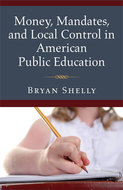 At times, local school districts may feel like
marionettes, with state and federal mandates contorting them to fit one policy
priority after another. According to this fascinating new book by Wake Forest
professor Bryan Shelly, higher levels of government can indeed manipulate local
education agencies with remarkably few dollars—as little as 5 percent of their
budgets. Shelly uses NCLB to illustrate this effect, showing that even state
and local politicians with serious reservations about the law implemented it
anyway, unwilling to cut ties to federal cash—or brave the political backlash
that would ensue. While some states (like Colorado and New Mexico) have passed
laws formally opposing various NCLB provisions, every state has at least
partially implemented 95 percent of NCLB’s provisions. The same is true at the
district level: Only seven of the nation’s 14,383 school districts have
formally opted out of NCLB. With these facts in hand, Shelly draws a simple but
important conclusion: A better way for higher levels of government to leverage
reform would be to ease up on onerous mandates, leaving to locals the heavy
lifting in areas like teacher quality and curriculum. State and federal money need
not be accompanied by the demolition of local control. Do that and local school
districts might start to whistle Pinocchio’s favorite tune, “I’ve got no strings.”
At times, local school districts may feel like
marionettes, with state and federal mandates contorting them to fit one policy
priority after another. According to this fascinating new book by Wake Forest
professor Bryan Shelly, higher levels of government can indeed manipulate local
education agencies with remarkably few dollars—as little as 5 percent of their
budgets. Shelly uses NCLB to illustrate this effect, showing that even state
and local politicians with serious reservations about the law implemented it
anyway, unwilling to cut ties to federal cash—or brave the political backlash
that would ensue. While some states (like Colorado and New Mexico) have passed
laws formally opposing various NCLB provisions, every state has at least
partially implemented 95 percent of NCLB’s provisions. The same is true at the
district level: Only seven of the nation’s 14,383 school districts have
formally opted out of NCLB. With these facts in hand, Shelly draws a simple but
important conclusion: A better way for higher levels of government to leverage
reform would be to ease up on onerous mandates, leaving to locals the heavy
lifting in areas like teacher quality and curriculum. State and federal money need
not be accompanied by the demolition of local control. Do that and local school
districts might start to whistle Pinocchio’s favorite tune, “I’ve got no strings.”
|
Bryan Shelly, Money, Mandates, and Local Control in American Public Education, (Ann Arbor, MI: University of Michigan Press, 2011). |
